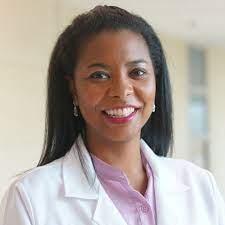Dr. Tracy MacIntosh is the Associate Professor of Emergency Medicine and Core Faculty in the Emergency Medicine Residency at HCA Florida Osceola Hospital, and Associate Dean of Access, Belonging and Community Engagement at the UCF College of Medicine. She attended Yale School of Medicine, where she also completed her residency in Emergency Medicine. Dr. MacIntosh serves as an educator and mentor for students, medical residents and Central Florida youth.
Dr. MacIntosh embarked on a career in medicine because she loved learning about science and math, and helping people. She didn’t have role models in healthcare in her immediate family but found a number outside of her family who encouraged and helped her enter the medical field. This alone moves her to get involved in programs and initiatives for teens and undergraduate students, to show them the way and aid them in fulfilling their dreams. This is a portion of a News-Gazette interview with her.
Why is diversity, equity and inclusion important in medicine and healthcare?
DEI has been maligned and misinterpreted by some individuals and organizations, so I’d like to set the record straight. DEI provides a framework to understand why we have healthcare disparities and healthcare inequities in our society—for example, to understand why people from Black, Indigenous, Hispanic, or low-income backgrounds die at higher rates from certain diseases and conditions compared to other groups in America.
Diversity means that we understand the importance of having doctors who share the same background, language, and cultural experiences as their patients. Many patients feel that they connect better with doctors who are like them, just like people connect with like-minded people in other aspects of their lives. As a doctor, I take pride in researching issues of healthcare deeply. Unfortunately, what we know in Florida is that black infants cared for by black doctors have a lower mortality rate than black babies cared for by white doctors (according to the 2020 study Physician–patient racial concordance and disparities in birthing mortality for newborns). My role is to think about what my individual bias is while at the patient’s bedside that could be leading to these types of conclusions, and to work to nurture a healthcare workforce that represents the patients we treat everyday.
Equity means that we allow every single person to live their healthiest life. We value everyone equally and seek to understand the rest of our patients, not just their disease. Our responsibility is also to develop healthcare strategies to help each individual get the help they need, which may be different for each patient depending on their social situation.
Inclusion means that we create an environment where everyone’s perspective is heard and valued. Having real conversations about how to make the workplace better for everyone. There’s a seat for everyone at the table when making decisions.
Real patients’ lives are at stake, which is why we talk about DEI in healthcare.
What are some of the strategies your hospital has employed to improve health equity in our community?
We’re focused on sharing the knowledge and passion we have about healthcare with the community. I’ve worked on a program to educate nurses where we provided interactive lectures and workshops around common issues that affect school kids, for example, asthma and trauma. Nurses learned what they need to know in order to properly treat them and know what cases need to come to the Emergency Department.
I am also part of a new initiative for families who are in housing transition to provide health education and mentoring to their children. We are partnering with the school board for this initiative, and our hospital also partners with local health agencies and health departments to coordinate care between organizations for the benefit of our community.
Why is celebrating and honoring Black History Month so important?
It’s important to recognize the contributions of Black scientists and healthcare leaders because it has too often been overlooked! Black people have made tremendous contributions to healthcare. It’s important for people to know that many healthcare discoveries were innovated by Black innovators. For example, plasma exchange and the storing of blood products was innovated by a Black surgeon named Dr. Charles Richard Drew. Dr. Daniel Hale Williams was an African American cardiologist and performed the first successful openheart surgery. It’s important for people to know these facts and to know that greatness is found in every community.
What do you love most about being an Emergency Medicine physician?
It’s a call to service: we care for anyone, anything, at any time. Those are the pillars that spoke to me most when I was choosing a specialty and career. We take care of any condition, day or night, regardless of race, ethnicity, immigration or insurance status. You come to us for help and you get it. I also love the teamwork mentality of the Emergency Department. Everyone has a vital role in the emergency department from our residents and nurses, to the radiology technicians and our environmental staff who clean, sanitize and turnover the rooms quickly so that we can see the next patient. Ultimately, I like solving a patient’s problem; listening to their story carefully, finding clues and connecting the dots to come up with the correct diagnosis and treatment plan.
What do you think is the top myth or misconception about the Emergency Room and Emergency Medicine?
The emergency room is great for a lot of things but we can't solve every problem with a single visit. There’s not always a diagnosis immediately apparent. Some tests can and should primarily be done by a primary care physician. Other issues should be handled through social workers or with a specialist during a scheduled out-patient visit. It’s important for patients to know that if you don’t have a test performed in the Emergency Department, it's probably because we don't have that particular test, or it's better to get one with a primary care physician or out-patient specialist who knows you and follows you. It's not because we don't care, instead, it's because we're part of a system and it's a process. Our emergency skills and training allow us to identify when a patient is stable and safe to go home versus something that’s more dangerous and serious. It's also part of our job to refer you to what's available in the community. You don't always have to stay in the hospital to have everything done. Our most important job is to make sure people are safe, and many tests and follow-ups are best performed through primary care and specialty doctors as an out-patient.
All views expressed in this interview and article are those of Dr. MacIntosh and not associated with any institution.




